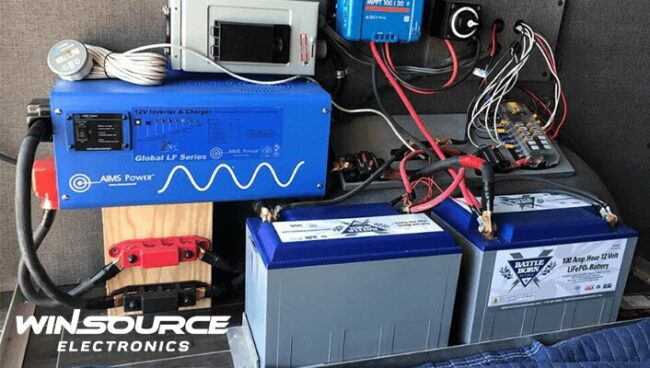
As an important electronic device in the power system, the inverter is used to convert direct current into alternating current. It has a wide range of applications in renewable energy systems, UPS (uninterruptible power supply) and industrial power systems. This article will delve into how inverters work and how they are used in power systems in order to gain a more complete understanding of the importance and functions of inverters.
Table of Contents
ToggleThe working principle of the inverter
Basic Principles of Inverters
An inverter is an electronic device that converts direct current into alternating current. It controls the switching state of the switching tube, and generates alternating current by properly transforming and modulating the voltage and current of the DC power supply. Inverters can be divided into several types according to the form of the output waveform, such as square wave inverters, modified sine wave inverters, and pure sine wave inverters. These inverters have different advantages and limitations in different application scenarios.
Inverter topology
Inverter topologies include various types, such as single-phase bridge inverters, three-phase bridge inverters, and multi-level inverters. Different topologies are suitable for different application scenarios and power requirements. Common topologies include full bridge, half bridge, and resonant, each with its own unique advantages and limitations. Choosing the proper topology is critical to the efficiency and performance of the inverter.
Control Strategies and Modulation Techniques
The control strategy and modulation technique of the inverter have a significant impact on the quality and efficiency of the output waveform. Common control strategies include pulse width modulation (PWM) and pulse frequency modulation (PFM). Pulse width modulation controls the amplitude and frequency of the output waveform by adjusting the switching time of the switching tube. Pulse frequency modulation controls the frequency of the output waveform by adjusting the switching frequency of the switching tube. These control strategies combine technologies such as current control, voltage control, and vector control to achieve the functional and performance requirements of different inverters.
Application of inverter in power system
Inverters in Renewable Energy Systems
Inverters play a key role in renewable energy systems such as solar photovoltaic systems and wind power systems. In a photovoltaic system, an inverter converts the direct current generated by photovoltaic panels into alternating current for use in the power grid or for storage in batteries. In wind power systems, inverters convert the direct current generated by wind turbines into alternating current and connect it to the grid. The efficient conversion and control capabilities of inverters in renewable energy systems are crucial to optimize energy utilization and improve system reliability.
Inverter in UPS
Inverters are used in UPS systems to provide temporary backup power. When the main power supply is interrupted, the inverter converts the DC power into AC power and supplies it to critical equipment to ensure its normal operation. The fast response and stability of the inverter in the UPS system is very important to ensure the continuity of power supply.
Inverters in Industrial Power Systems
Inverters are widely used in industrial power systems such as variable frequency drives and power quality control. By controlling the output frequency and voltage of the inverter, the variable frequency drive realizes the speed control of the motor and improves the efficiency and operation stability of industrial equipment. Inverters in power quality control are used to adjust voltage and frequency in power systems to provide stable power supply and high-quality power waveforms. The application of inverters in industrial power systems can improve the control accuracy and response speed of the system, and provide higher energy utilization efficiency.
In conclusion
As an important electronic device that converts direct current to alternating current, inverter plays a key role in the power system. A deep understanding of the working principle and application of inverters is of great significance for optimizing the operation and energy utilization of power systems. The continuous innovation and application of inverter technology has promoted the development of the power system, providing strong support for realizing clean energy, improving energy utilization efficiency and ensuring the stability of power supply. Through continuous research and development, inverters will continue to play an important role in the power system and promote the sustainable development of the power industry.

COMMENTS